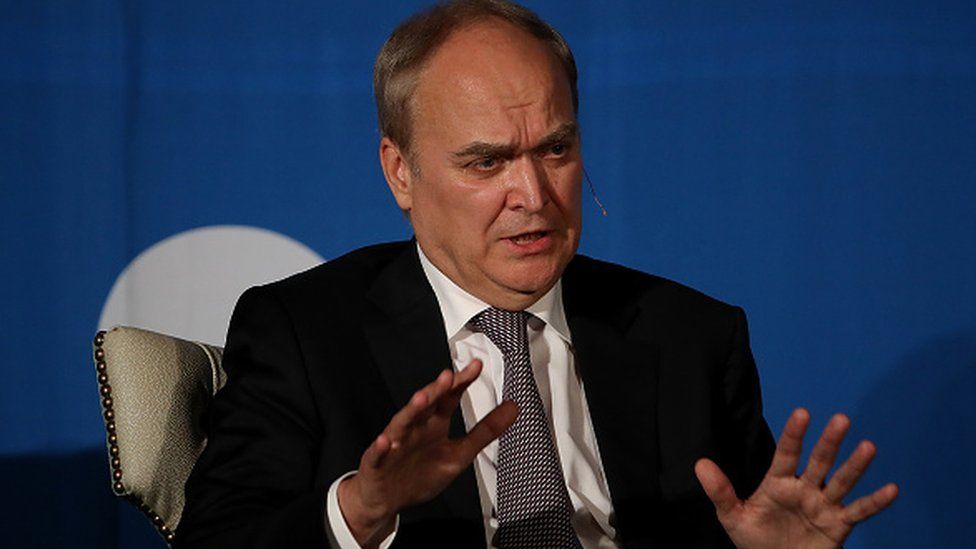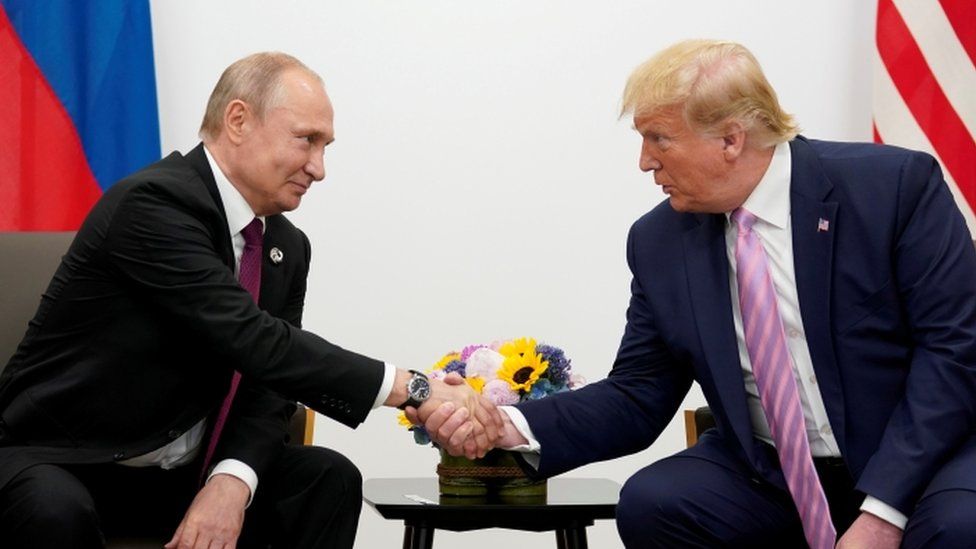Putin on Biden: Russian president reacts to US leader’s criticism
Putin #Putin


image copyrightGetty Images image captionRussia says it has called back its ambassador to the US, Anatoly Antonov, for consultations
Russian President Vladimir Putin has reacted to stinging criticism from his US counterpart Joe Biden by saying, “it takes one to know one”.
Mr Biden had told an ABC News interviewer that Mr Putin would “pay the price” for alleged meddling in the 2020 US election.
He also confirmed he considered Mr Putin to be “a killer”.
In response, Russia called home its ambassador for talks to prevent the “irreversible deterioration” of ties.
The Russian government said Anatoly Antonov had been called back from Washington to Moscow as relations with the US had reached a “blind alley”.
Mr Biden had been commenting on an American intelligence report that suggested Mr Putin had authorised an interference campaign in last November’s presidential election in the US.
The report accused Russia of trying to sway the election in favour of former Republican President Donald Trump, who was defeated by Mr Biden, a Democrat.
The US is expected to impose sanctions on Russia as soon as next week over the report’s conclusions.
What exactly did Putin say?
Rejecting Mr Biden’s accusations, he used a Russian school playground rhyme, which literally translates as “whoever calls names gets called those names”, and equates in English to “it takes one to know one”.
“You know I remember in my childhood, when we argued in the playground we used to say, ‘it takes one to know one’,” he said in comments broadcast on state television.
“And that’s not a coincidence, not just a children’s saying or joke. It has deep psychological meaning. We always see our own traits in other people and think they are like how we really are. And as a result we evaluate [a person’s] actions and give assessments.”
Previously, the Russian president has rejected accusations that the Russian state had tried to assassinate opposition politician Alexei Navalny last year with a nerve agent.
Mr Putin’s spokesman, Dmitry Peskov, said earlier that the latest US accusations were not backed by evidence and would further harm bilateral ties.
The Russian foreign ministry said in a statement: “Russian Ambassador to the United States Anatoly Antonov has been summoned to Moscow for consultations in order to analyse what needs to be done in the context of relations with the United States.”
Russia, it added, was interested in “preventing an irreversible deterioration in relations”.
“The most important thing for us is to identify ways of rectifying Russia-US relations, which have been going through hard times as Washington has, as a matter of fact, brought them to a blind alley,” it said.
What had Biden said?
Mr Biden told ABC he had warned Mr Putin about a potential response to alleged election meddling during a call in late January.
“He will pay a price,” Mr Biden said in the interview, broadcast on Wednesday.
![]()
Asked what the consequences would be, he said: “You’ll see shortly.”
When asked if he thought Mr Putin was “a killer”, President Biden said “I do”.
In a later news conference, White House spokesperson Jen Psaki said relations between Russia and the US would be different than under the Trump presidency.
“Certainly the Russians will be held accountable for the action they’ve taken,” Ms Psaki told reporters.
What did the US intelligence report say?
The 15-page report, released on Tuesday by the Office of the Director of National Intelligence, outlined what it said were “influence operations” pushed by Russia as well as Iran.
It said Russian-linked individuals had spread unsubstantiated claims about President Biden ahead of the 3 November election.

image copyrightReuters image captionUS intelligence concluded in 2016 that Russia was behind an effort to undermine Hillary Clinton’s presidential run against Mr Trump
It also said a disinformation campaign had sought to undermine confidence in the broader election process.
According to the US report, some people connected to Russian intelligence also pushed anti-Biden narratives to media outlets, senior officials and allies of Mr Trump.
![]()
You might also be interested in:
media captionFrom 2016: Gordon Corera reports on an “extraordinary” claim Russia tried to influence the US election
![]()